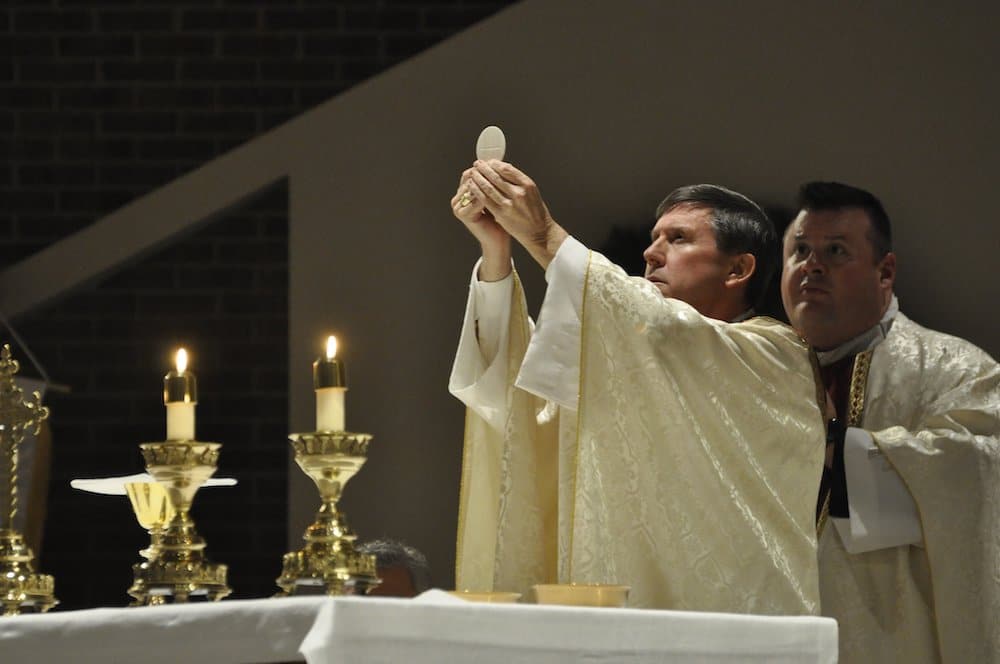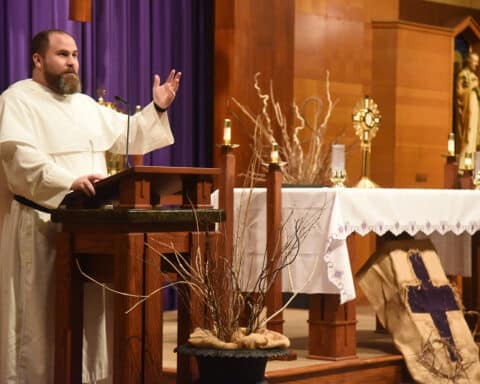“O Sacrament most Holy, / O Sacrament Divine, / All praise and all thanksgiving, / Be every moment thine!”
Many parishes recite this prayer together after receiving Communion. It is a beautiful prayer, and most fitting to Sunday’s solemnity of Christ’s Body and Blood. Perhaps what is most beautiful about this prayer is how it actually addresses the Eucharist just as it would address God: “all praise and all thanksgiving be every moment Thine!” With these words, we address someone: We greet and praise the Eucharistic Lord.
During this first year of national Eucharistic Revival, we have been called to renew our understanding of Christ’s true presence among us in the Eucharist. This Sunday, John’s Gospel helps us grow in understanding of the real presence of Christ in the Eucharist.
Unlike the other Gospels, which recount the Last Supper in detail, John’s Gospel presents Jesus as teaching about the Eucharist at a synagogue in Capernaum. Thus, later in the Gospel, when Christ’s Passover comes, the disciples will connect Jesus’ teaching on the “Bread of Life” in Capernaum with the life given for them in love upon the cross. In truth, it is still this life and love that nourish us when we receive the Eucharist today. It is our bread: “whoever eats this bread will live forever” (Jn 6:58).
| June 11 – Solemnity of the Body and Blood of Christ |
|---|
|
Dt 8:2-3, 14-16 |
But this can be a hard truth to grasp: “the one who feeds on me … who eats my flesh and drinks my blood,” that one will have life. What does it mean to “eat” the one whom we greet and praise in the Eucharist? And to receive life from such a meal?
The Catechism of the Catholic Church is helpful on this point, lifting our minds to the fullness of the truth about the life we receive in the Eucharist. The Eucharist, the catechism says, is “Communion with the flesh of the risen Christ” (No. 1392). The Eucharistic Lord is the risen Lord! He is both the one who carried out our forgiveness on the cross and the one who conquered death by love. Thus, Christ’s own flesh was not only “given life” by the Spirit, but still “[gives] life through the Holy Spirit” today (cf. Catechism, No. 1392). This is the life that we receive when we feed on him.
It also seems that John, in comparison to Matthew, Mark and Luke, speaks about this life-giving food through the lens of an experience of Christ belonging particularly to John’s own life: the wedding feast at Cana. There are some biblical scholars now who believe this wedding feast may very well have been John’s own wedding feast. Whether or not John was the bridegroom in question, John still offers the intimate occasion of a wedding and its joyful meal as our first encounter with Christ, signifying the quality of a life lived in communion with Christ, vivified by the Spirit of Love.
As before, the Catechism tells us about this deeper reality, citing John’s Gospel: “the principal fruit of receiving the Eucharist in Holy Communion is an intimate union with Christ Jesus. Indeed, the Lord said: ‘He who eats my flesh and drinks my blood abides in me, and I in him'” (Catechism, No 1391; cf. Jn 6:56). Like Christ’s disciples, the Church connects Jesus’ discourse with Christ’s sacrifice of love: the giving of his very life for ours.
Thus, the next time we are before the altar for the celebration of the Eucharist, we should listen for Christ’s words, as if they are spoken directly to us: “This is my body, which is given for you,” and “This cup is the new covenant in my blood, which will be shed for you.” And maybe we could respond to him, having sat at the table of our wedding feast, and respond:
“O Sacrament most Holy, / O Sacrament Divine, / All praise and all thanksgiving, / Be every moment thine!”





